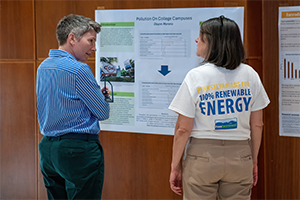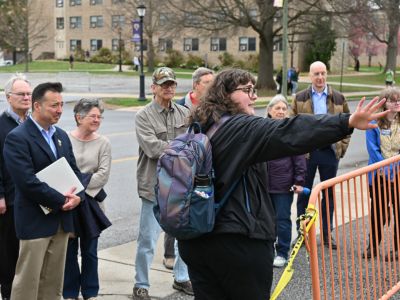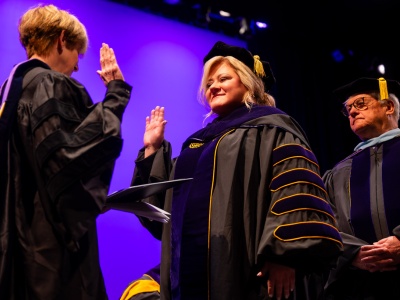National Endowment for the Arts Awards $149,000 to WCU for Research into Equity Via the Arts for Children
Ellie Brown
 A child clinical psychologist WCU Professor of Psychology, Ellie Brown is the lead
investigator in an initiative newly funded by the National Endowment for the Arts
(NEA). The $149,819 NEA Research Lab award enables the establishment of a Research on Equity via the Arts
in Childhood (REACH) lab. This project will support studies advancing scientific understanding
of how high-quality musical experiences can mitigate the effects of poverty on young
children.
A child clinical psychologist WCU Professor of Psychology, Ellie Brown is the lead
investigator in an initiative newly funded by the National Endowment for the Arts
(NEA). The $149,819 NEA Research Lab award enables the establishment of a Research on Equity via the Arts
in Childhood (REACH) lab. This project will support studies advancing scientific understanding
of how high-quality musical experiences can mitigate the effects of poverty on young
children.
Brown will collaborate with co-investigators Dennie Palmer Wolf and Steven Holochwost from WolfBrown. Palmer Wolf is WolfBrown principal researcher and one of the nation’s leading arts education researchers and evaluators. Holochwost is principal and Director of Research for Youth & Families, working with programs designed to improve the lives of vulnerable children and youth.
Through the REACH lab, researchers and researchers-in-training will collaborate with organizations dedicated to expanding access to high-quality music and arts experiences to advance scientific understanding of how those experiences may promote equity for young children facing effects of poverty, racism, and related forms of adversity.
Brown has previously provided scientific evidence that the arts can get under the skin by measuring levels of cortisol – a stress hormone – in Head Start students at Philadelphia’s Settlement Music School, research that was also funded by the NEA.
“Music and the arts cannot guarantee equality, nor can they undo the root causes of inequality, such as a poverty and racism, but they may have the potential to counter some of the toxic effects of these forms of adversity on young children,” said Brown. “I’m thrilled that we have the opportunity to advance scientific understanding of how music can contribute to our shared goals of equity.”
A keystone study will be conducted with Settlement Music School, an organization Brown has collaborated with for more than a decade. Other initial studies will be conducted with additional arts partners including Play on Philly, Carnegie Hall, and World Café Live to examine whether and how high-quality musical experiences can foster children’s self-regulatory capacity: the ability to modulate emotions, attention, and behavior in the service of learning and prosocial interaction. They will investigate whether music’s effects on self-regulation are transmitted or carried by changes in children’s neurophysiological function and identify specific aspects of musical experiences that are especially important promoters of change.
Brown expects to begin research this summer with graduate students including some in WCU’s Clinical Doctor of Psychology (PsyD) program. She will also engage 20 to 30 undergraduates through her Early Childhood Cognition and Emotions Lab (ECCEL), in which psychology majors develop key skills while contributing to communities.
There are multiple benefits to this research, Brown points out, including for WCU students who gain meaningful experience working with schools, children, and their families. “Our results will help arts and early childhood organizations to refine their programs with goals of providing impactful music experiences, alleviating stress, and promoting positive development for children facing economic hardship. One of the programs specifically uses music to support positive parent-infant attachment relationships.”
“The REACH studies focus on how music can promote equity for children facing poverty and racism, and we’re excited to advance this goal.”
The REACH lab is one of five new projects of NEA Research Labs, which funds transdisciplinary research partnerships, grounded in the social and behavioral sciences, that examine and report on the benefit of the arts in non-arts sectors. For more information on projects included in the Arts Endowment grant announcement, visit arts.gov/news.
Recent University News

West Chester University Celebrates Earth Day with 3rd Annual Zero Waste Summit

"Voices for Clean Energy" Tour Highlights WCU's Geoexchange System

West Chester University Inaugurates its 16th President

